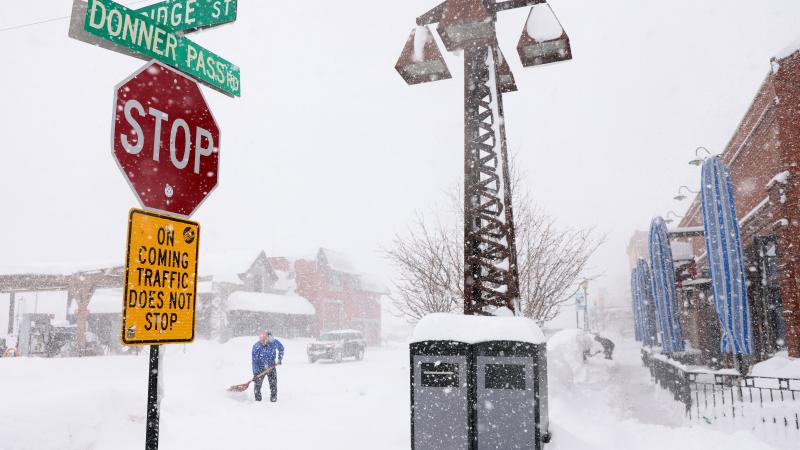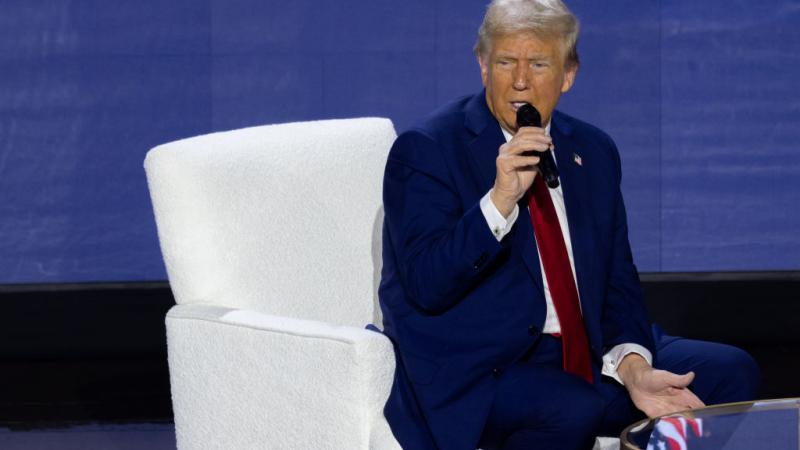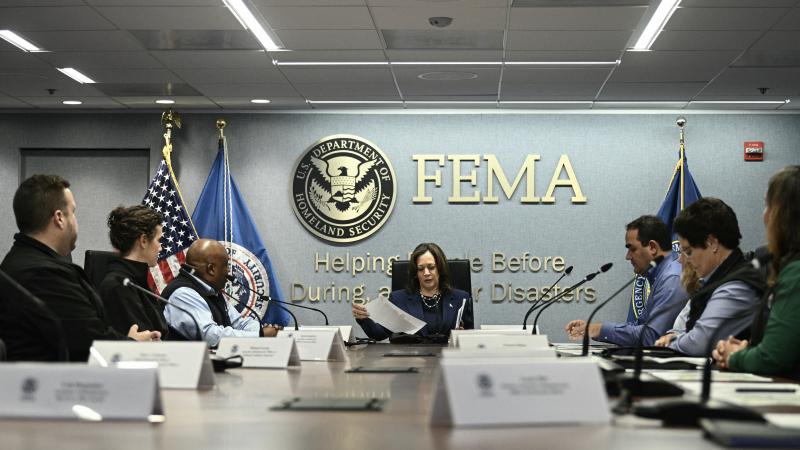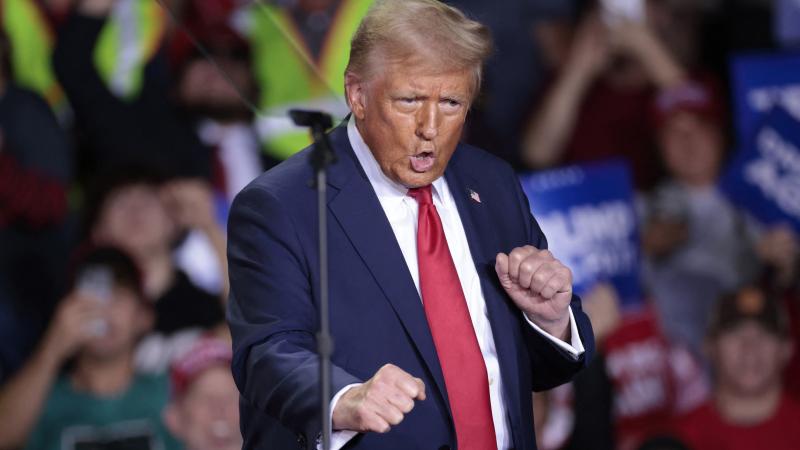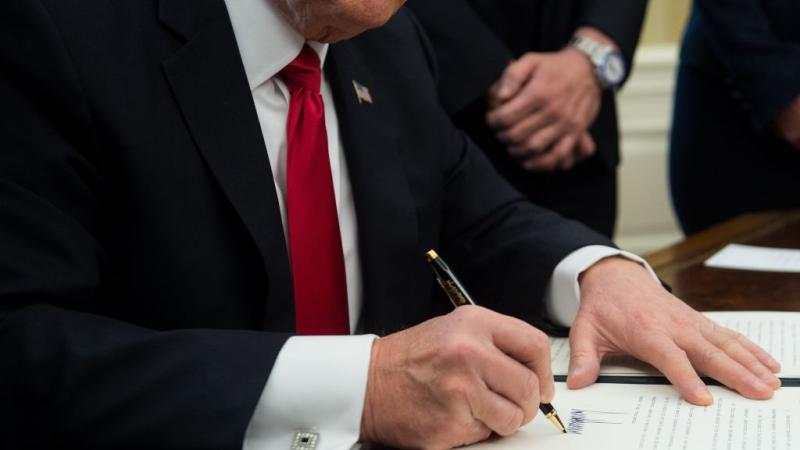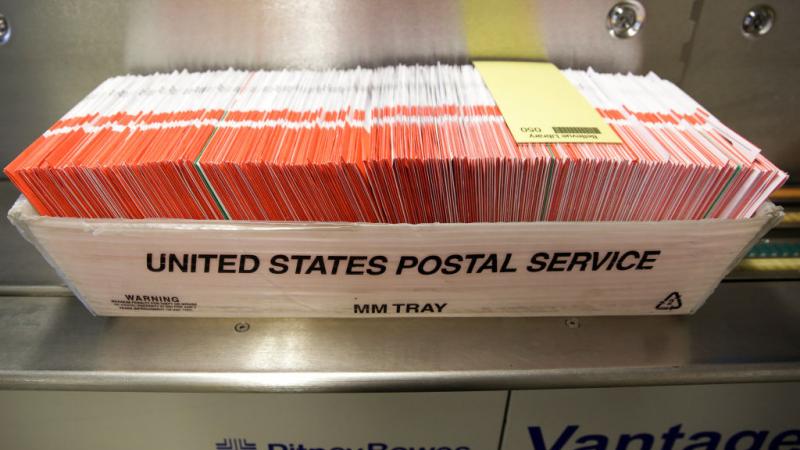Walid Phares: The Russian investigation may not be about Russia
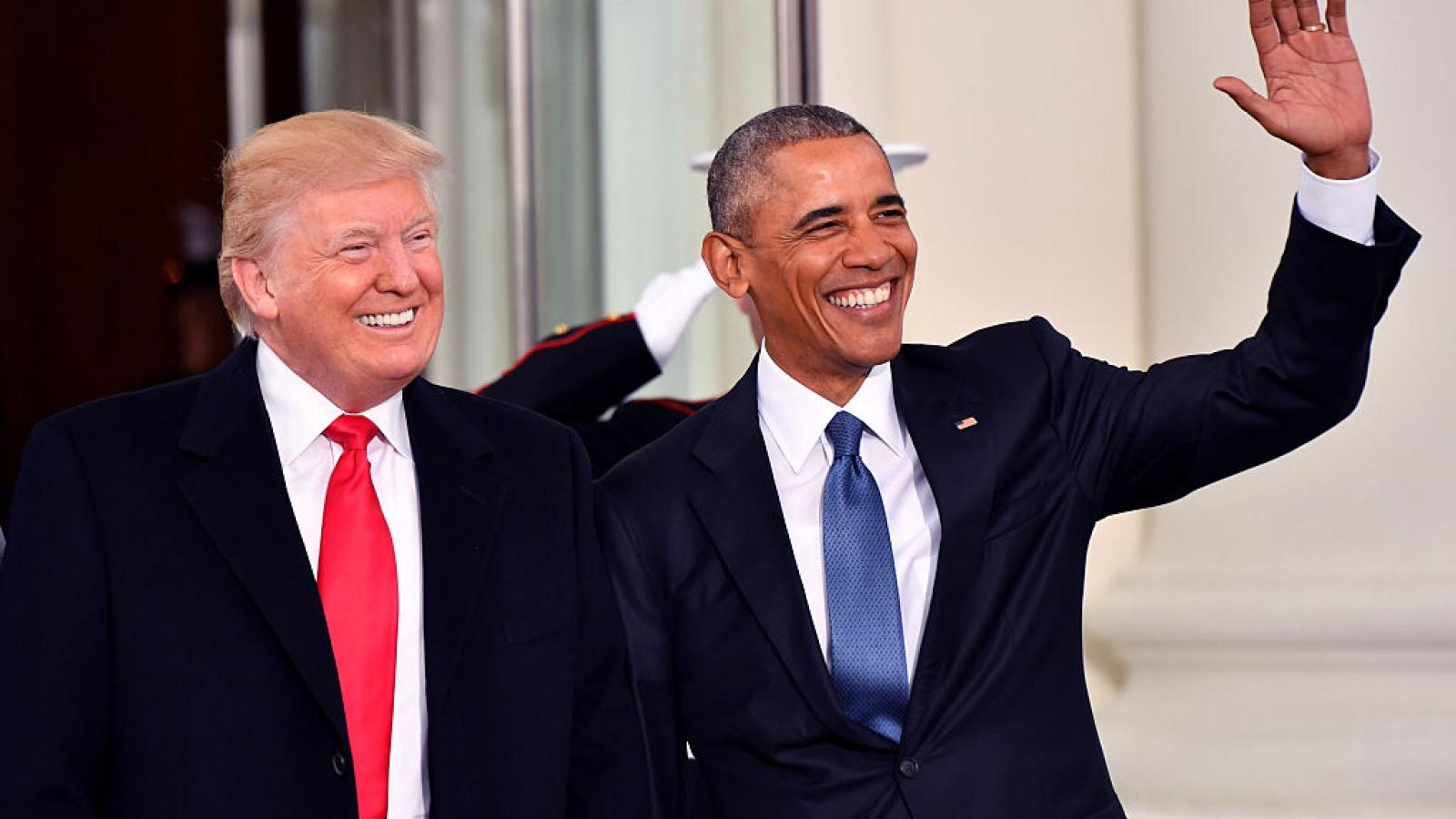
The former Trump adviser says it began With Obama’s Iran Deal.
Full transcript:
John Solomon:
Hello America. And I know it's Wednesday, but guess what? We're doing a special edition of John Solomon Reports Today, the podcast from Just The News, and there's a reason we're doing it. We've got one of the key figures in the Russia collusion case, one of the key witnesses, a former advisor to President Trump, who is breaking his silence for the first time on what went on all behind the scenes with the Mueller prosecutors, with the Congressional Committees, and the real story why he was targeted.
John Solomon:
Yup. We're talking to Dr. Walid Phares today. We're not going to do any monologues, we're not going to do any news headlines. We're going to go straight to this incredible interview. We've got more than a half hour with Dr. Phares, and we want you to hear his story in the first person. It's the first time he's really talked about it, and he wants to set the record straight, and also raise a provocative question. And that question is, "Was the Russia collusion case about something else other than Russia?"
John Solomon:
He's got a pretty provocative answer to give to that. All right, we're going to go to a quick commercial break, buckle your seat belts. When we come back, Dr. Walid Phares in his first major interview describing what went on between him and prosecutors, and Congressional investigators in the Russia collusion case. I know you've been troubled by a lot of what's happening in this case. When you hear Dr. Phares' story, I think you're going to be even more troubled. First, commercial break. We'll be right back.
John Solomon:
All right, folks. Welcome back from the commercial break and as I promised, a very special guest, Dr. Walid Phares, one of the great minds in the conservative foreign policy space joins us. Dr. Phares, thanks for joining us today.
Walid Phares:
Thank you, John, for having me today. It's a pleasure and honor.
John Solomon:
It's my honor too, to have you. Before we get started, because I know we want to talk about Russia collusion and your experience with Congress, and the media, I'd like to just introduce you a little bit more to our audience for those who aren't foreign policy nerds like me, because I'm always excited about foreign policy, NASA, security. You have a very large reach. You've advised Congress members, presidential candidates. Could you introduce yourself a little bit? Just about some of the impact that you've had in testifying before Congress, advising lawmakers, and advising presidential candidates.
Walid Phares:
Well, thank you so much for this opportunity. Yes, for those who are listening to us, I have been in this field, in this business, if you want, for the last, maybe 27 years, '90s after 9/11, and of course all the way to the Trump campaign and beyond. As a professor originally, I have testified to Congress already in the mid 1990s on human rights, terrorism, the Jihadist movements. After 9/11, my role in educating the public and also lawmakers increased. I became analyst with what? MSNBC first, and then Fox News for the last 14 years.
Walid Phares:
But more importantly, I have briefed, maybe dozens and dozens of Members of Congress, variety of committees, both parties and European Parliament Members. On the policy level, obviously as it's known in the media, I have been appointed by Mitt Romney in 2011/2012 as his Senior National Security Advisor for the campaign. And in 2016, by then candidate Donald Trump, as one of his Foreign Policy Advisors. I have had many contacts worldwide with heads of states, prime ministers, ministers, national security advisors.
Walid Phares:
And probably to me as important, I have had a long engagement with the executive branch of our government, especially with the agencies. For the last 15 years, probably I have lectured and trained more than five to 6,000 analysts. So, it has been a whole lifetime, if you want, of engagement in foreign policy and national security.
John Solomon:
Well, it's funny. I remember the first time I was introduced to you, and a intelligence official had mentioned that I should reach out to you. And the first thing he said is, "He saw counter-terrorism coming, before counter-terrorism was even a thought in the FBI's eye." And I think that your role in seeing the rise of radical terrorists and America's slow adaptation to fight them was very instrumental in the late '90s and early 2000s.
John Solomon:
And a lot of people actually go back and take a look at your early work because you saw what was coming. And also, I think you helped our government, particularly our intelligence agencies adapt to a new mindset, that it wasn't about solving crimes, it was about preventing terrorist attacks.
Walid Phares:
Yes, John. Actually in the mid '90s, you're right, I was among the very, very few experts. I was a professor at the time who were warning our Members of Congress and the executive branch, of the coming of the Jihadist strikes on the Homeland. And when that happened after 9/11, that's why my role increased in training, and in of course, giving seminars. I then participated with the Chairwoman of the Subcommittee on Intelligence, Sue Myrick, in forming the Anti-Terrorism Caucus that had at one time 110 Members of Congress, both Democrats and Republicans.
Walid Phares:
And we focused, as you just mentioned, John, on predicting, not just our reacting to terrorism, but on predicting the ideological, political, security components of what is to come. That was done before ISIS, and before the Iran deal, and before the rise of all these movements in North Africa, the middle East, and even of course as the strikes inside Europe and United States were multiplying. That was a great experience.
Walid Phares:
The second one, of course, were my books that were read by many across the government of the United States, in Europe, on campuses. I could name only three, but many of my readers remember Future Jihad, that was 2005, Strategies Against America, The War of Ideas which was published in 2007. One very popular book was The Coming Revolution, which predicted actually the rise of the Arab Spring in 2010, one year before it happened.
Walid Phares:
My last book in 2014 was the Lost Spring, I was criticizing at the time, the Obama administration for two things in the book. One is that partnership with the Muslim Brotherhood that went, and hence, what civil societies wanted in the region, and what became the Iran deal later. So, these were experiences I had obviously for the last 25 years, that really marked my work in America.
John Solomon:
I could probably count on one hand the number of people in the 1990s that were as insightful and foresightful as you were, in seeing what they're. Maybe John O'Neill at the FBI, and Richard Clark at the White House, but there were very few people that saw the rise of this terrorist threat on U.S. soil, and you definitely were one of them. And it's a remarkable tribute to your wisdom and the work that you've done. I want to fast forward now to 2015, the beginning of the 2016 election. If I remember correctly, you started by advising some candidates like Scott Walker and Ben Carson, is that correct?
Walid Phares:
Yes. Well, tradition was that most advisors to previous Republican candidates ... It was my case with Mitt Romney, 2011/2012, we called him to help the new number of Republican candidates. And I have advised either directly or indirectly, about four Republican candidates, even before Donald Trump.
John Solomon:
And then in December of 2015, you got a call to the Trump Tower in New York, correct?
Walid Phares:
I did have a call basically for everything. I think Mr. Trump at the time, during that fall was meeting with a number of experts in foreign policy, national security, and he wanted to know a little bit more about their views and their projections for the future.
John Solomon:
And so you met with the candidate for a while. I think Corey Lewandowski was there. And you guys just talked about policy, particularly the Middle East. I think that was the primary focus, correct?
Walid Phares:
Absolutely. The meeting was long. It was supposed to be maybe 40 minutes. It took less than two hours. Candidate, Donald Trump at the time, was very curious about the variety of Middle Eastern issues, who are the players? What are the threats? That fall, if you remember, he had been speaking against the penetration by Jihadists and extremist in the United States, all the violence that occurred in Paris, and in here. But he was very keen to understand, "What is the projection for these bad actors, and what can be done?"
Walid Phares:
He was also discussing the issue of vetting. How do we identify them? And of course, in addition to the Middle East, they said the Arab-Israeli Conflict, the various tensions that exist. It was a very, very important session at the time.
John Solomon:
And I ask this only because obviously you eventually got dragged into the Russia investigation, but how much did Russia come up in that December conversation?
Walid Phares:
In December conversation, none. As a matter of fact, we really focused on the Arab countries, Israel-U.S. role, and of course, Homeland Security. But I don't remember that Russia was even mentioned in that meeting, not in that meeting.
John Solomon:
Let's put a pin in that for the listeners, and remember that. Because when you hear what happens to Dr. Phares later, it will turn your head upside down. All right, I'll fast forward a little bit to walk people through this remarkable timeline. In March, you get announced as one of the Foreign Policy Advisors for future President, Trump. And then over the spring and summer, there's the typical interactions that you have with the candidate you're advising.
John Solomon:
And then in September you arrange, because it's in your sphere of influence, for the President to meet with General Sisi in Egypt, the current ruler of Egypt which was one of his important foreign policy meetings. Describe how that came about.
Walid Phares:
Let me be very specific here, because it is the first time I speak about it in public. That long [inaudible 00:10:19], but let me address it. I was in charge of, or I developed the foreign policy explanation of the Trump campaign not myself, many of us. But I [inaudible 00:10:36] languages, having visited I countries, I would meet with diplomats, and I would meet with foreign policy experts. It was intense for many, many months. I, of course, went to Europe, and in Europe I spoke to members of the European Parliament for about 27 countries, and I engaged with Middle Eastern leaders, I traveled to Egypt in September. I met with the minister of Religious Affairs.
Walid Phares:
I was very interested, John, in understanding how to make a distinction between the Jihadists and the Moderates. That was important for our research in the campaign, and of course, I had been doing this for the previous many, many years. I met also with the Deputy Pope of the Christian cops, because the President, candidate then, was interested in the protection of minorities. Then at least [inaudible 00:11:30] research and field contacts. Obviously in the month before that, I have been interviewed by God knows how many Arab media, including many Egyptian media, UAE media, or Jordanian media.
Walid Phares:
And I have suggested in public that it would be very useful that candidate Trump would be meeting as previous candidates have planned. In 2011/2012 as candidate Obama did by traveling to Germany, if we all recall, and speak in front of the Berlin wall. From that mindset, I was suggesting that Donald Trump should be meeting with world leaders, including Arab, Muslim leaders, because of the attacks against him. He has been really savaged by Brotherhood, by the pro-Iranian lobbies that he's an Islamophobia, he's a racist, et cetera. [inaudible 00:12:20] as foreign policy people, so I suggested the ideas in the media.
Walid Phares:
Now, obviously many people, they campaign and elsewhere, and I pushed for the idea and [inaudible 00:12:31]. Let me add one thing, is that the President of Egypt, Mr. Sisi was coming to the United Nations General Assembly anyway. And he wanted to meet with the two candidates, which he did. Basically our role was suggesting and confirming the idea from the media first, and with whomever we spoke, that this would be a wonderful idea.
John Solomon:
And the campaign signed off on it. The President attended the meeting, and and got to interact with a world leader in the middle of the campaign as did Hillary Clinton, correct? Both met with President Sisi.
Walid Phares:
Yes. As a matter of fact, John, the same day I was in New York. I was not at the meeting, but I was in New York and President Sisi met with both. But there were many other presidents and leaders who met with ... [inaudible 00:13:16] they do only at the United Nations. And previously, candidates have done this, and it's almost a tradition. You go to [inaudible 00:13:24] somebody, you show your international potentials. That was the only one of the many meetings that [inaudible 00:13:30]. In my view, it was important specifically because of the criticism that Donald Trump at the time was receiving.
John Solomon:
Now, that it was an important meeting, got a lot of attention. And the election happens, and President Donald Trump becomes the 45th American President. And you don't actually go into the administration. You stay on the outside. Was that your choice?
Walid Phares:
I served as a Foreign Policy Advisor to the campaign, really from the beginning of 2016, though I had briefed the candidate at the end of 2015. But officially 2016, all the way till election day and few days after, then the transition [inaudible 00:14:11], I decided at the time not to be considered for the administration, to stay in some sort of reserve. If needed, I'll be happy to help. But I had many activities I wanted to continue with.
Walid Phares:
And you are in a position where you do your activities in media and in relationship, in lectures, unless the administration would want to use you. I was in that reserve. I did not join the transition. I did not join the administration.
John Solomon:
As you began to watch the early presidency take fold, you saw what happened with Mike Flynn. He's forced to resign very early on. What was your impression of what was going on?
Walid Phares:
Look, it was a very difficult time. First of all, we didn't understand what was happening. And I even made that complaint, meaning the issue of speaking with a foreign government when you are a transition. I remember doing the previous transitions for Obama, and previous transition for Clinton, and of course Bush, sitting, [inaudible 00:15:16] administration would say, "We're not going to do anything before we are the elected administration." You know what I'm saying? It was the different logic.
Walid Phares:
The state departments of the departing administration will tell their people, "Don't do anything. Let's always ask the transition, because they are going to be the new administration." What was happening to the members of the Trump team was very strange. And as a professor in political science, I was wondering, "Yes, of course the transition should be actually talking with foreign governments and ministers." Then we remember that the president elect was receiving phone calls and speaking with leaders. Of course, his advisors should be doing the same.
Walid Phares:
So, General Flynn in his position, even in New York, was supposed to be speaking with these people. Now, the content of what he was talking about, this is the privilege of the transition. What they needed to do was to talk to each other. That the transition and the sitting administration till January, should be talking to each other. And the one giving the guidance is not the [inaudible 00:16:22] one, it should be the one that has been elected. I found it very strange, that he was even interviewed about the tenor of his conversation. If it's a policy conversation, it will become public in 25 days or in 30 days. Why was he asked about it was really enigmatic.
John Solomon:
And in your mind when you look back, was the Obama administration just simply having a hard time giving up the reigns of power, and not deferring to Donald Trump? Is that what it felt like as you watched it from the outside?
Walid Phares:
Look, to be very direct and honest about it, and this is not the first time in history that it happens, not even in the United States, the Obama administration obviously was not happy. Not just because Donald Trump won the election, but they knew that he was about to change it. They were in full disagreement about a range of issues, including relationships with foreign powers. The most important point that they were concerned about, and that was not a secret was the fact that Donald Trump said during the campaign that he will be withdrawing, he will be canceling, he used different terminology, the Iran deal.
Walid Phares:
And the Iran deal was a major strategic achievement of the Obama administration. Definitely they were not happy with that point. And Donald Trump also in his campaign, we're talking about changing, shifting alliances in the region. He didn't want the partnership with the Muslim Brotherhood. And one of [inaudible 00:17:40] achievement of the Obama administration was a partnership with the Muslim Brotherhood. And of course, relationship with Russia, relationship with China.
Walid Phares:
There was a massive change in foreign policy that the departing administration was not happy with. But [inaudible 00:17:56] democracy is, you've got to accept that change and become the opposition, and then criticize. You cannot affect a change of an incoming administration.
John Solomon:
That's a fascinating analysis that a lot of people haven't really grasped in terms of what was really going on in that November, December, January. They were listening in on Mike Flynn's calls because they don't want Mike Flynn and Donald Trump to change the foreign policy direction of the country that they had set with their own compass.
John Solomon:
But Donald Trump had a different compass, a different destination, a different idea. And so, you're watching this play out for several months. And then, in September of 2017 my reporting indicates, you get a knock on your door one day and there was a couple of FBI agents outside. Tell me what that was like.
Walid Phares:
Well, that's a long story. I'll talk about what I can talk about at this point in time. But at one point, of course, we will expand on it. Before that, in March, April, and the hearing sessions about the Russia investigations, the so-called Russia links to the campaigns started. I found it really strange because during my time in the campaign, at least my time, I haven't seen anything indicating that there was a Russia influence on the leadership.
Walid Phares:
Now Russia influence, all the time we can talk about it later is, is what they do. They do it everywhere with all the campaigns, with everything they can influence, that's how Russians operate [inaudible 00:19:22]. But then I saw that CNN posted my picture during that time with other members of the campaign saying that, "These advisers had contacts with Russia." And my picture was there. I said, "What?" If there was one government I have not had any contact with, along with China, probably it was Russia.
Walid Phares:
I had contact with 20 countries, 40 countries, including diplomats day in, day out. I was meeting with all these diplomats and meeting with the lawmakers, but not with Russia. So, why are they doing this? I found that they were focusing on Foreign Policy Advisor. So, there was a reason for why they were doing this. Then, [inaudible 00:20:05] approached us, as they did for many advisors and they wanted to ask us questions.
Walid Phares:
I don't want to go into the details why, John, because the process is still on and you're one of the journalists, their leading journalists who are reporting about it. I want to wait for the entire process to be over, to know exactly what was happening, because until now I have no idea what was my role in it, and why was I even considered? But you're right, [inaudible 00:20:36] approached me, and they asked questions, and the questions obviously were about the foreign policy of candidate Trump. What was that foreign policy about?
Walid Phares:
Part of it was an issue [inaudible 00:20:48] were the foreign policy entries. And since I had served during the year 2016 as one of the Foreign Policy Advisors, obviously they [inaudible 00:20:58], as they did with, I think most of the other advisors.
John Solomon:
And so these agents were working for Mueller. Eventually you were interviewed by Mueller's lawyers as well. Obviously nothing came of it. You weren't charged, you weren't accused of any wrongdoing. And then you go before the Senate and House Intelligence Committees ... And I just want to remind all of our listeners at this point, Dr. Phares' responsibilities were not Russia. It was the Middle East, it was an entirely different area, and yet he's hauled before multiple Congressional Committees and team Mueller. What was the experience like when you were in the Senate and in the House talking to lawmakers?
Walid Phares:
Look, for the house, my testimony is out. I invite people to go and read it. I am not impressed with it because it was comprehensive, 130 pages. I hope the Senate will listen and publish mine as well. It had analysis. Of course they've asked me both branches, both committees, asking me about what did I see during the campaign? And it was my duty as a citizen, and as an actor then, in that campaign to tell them, to share with them what has happened. All the questions about Russia were very simple.
Walid Phares:
I have not seen myself any Russian operation, any influence, but I did something on my own to explain to them as a scholar, how Russia operates. And in my view, they were going in the wrong direction. The Russian leadership would not come directly in the campaign. They have not established relationships for the previous 10 years. I taught and studied how intelligence operate.
Walid Phares:
I taught seminars to our intelligence analysts for 10 years. I know what I am talking about. It's not just how the Jihadists and the Iranians operate, but how any foreign hostile force operates with us. It was first strategically wrong to believe that the Russians will, over a few weeks, few months, decide to penetrate almost openly American campaign without triggering the interest of American agencies who are observing them. And Russians are intelligent. Their influence was happening elsewhere, John. Influence has been built years and years ago.
Walid Phares:
All you have to do, and I mentioned this in the House intelligence here [inaudible 00:23:20]. And of course at the end and the Senate one, look at what RT, Russia TV had as platform and who has been interviewed. Dozens and dozens of American politicians, and scholars, and [inaudible 00:23:35]. They were interviewed, especially those who had sympathy for Russia. It goes back to 40 years of either Soviet sympathies, or Russia sympathies. There is a whole part on the very left of our spectrum that has those relationships with the Russians.
Walid Phares:
This is where the influence was. But then you move to the right side of it, you have to be very clear about it. You have many people in America. Like for any country, the Irish like Ireland, the Jewish Perkins are sympathetic to Israel, the French-speaking with France. You had many Americans virtually [inaudible 00:24:08] to like Russia. The Russians tried to recruit there, tried to move there, tried to play.
Walid Phares:
It's not [inaudible 00:24:14] Facebook that is going to change the vote of 335 million. I made that assessment available to the Senate and the House, meaning I was trying to tell them what to research if they were really objective. I wanted to know what Russia was doing. This was the academic way to do it. Unfortunately, it was too much politicized. Who met with the Russian Ambassador? You meet with him for five minutes, just like some of the members from the campaign, during a State Department- sponsored meeting in, I think it was in Ohio during the convention. They met with the Russian Ambassador.
Walid Phares:
What can you say in five minutes? And the Democrats were also meeting with the Russian Ambassador. To summarize it, John, I have tried to analyze it in a very objective way to help the government, to help the Senate, to help the House, and people that they will have [inaudible 00:25:04] really was the [inaudible 00:25:05].
John Solomon:
When you look back ... And I've had interviews, and this is a theme that has really developed for me in the last couple of months. I've talked to FBI insiders, current informer, I've talked to lawmakers who spend a lot of time rethinking everything that we've just been through over the last three years. And the sentiments that are beginning to emerge across the board from people I talk to are, "What really went on with the Russia collusion investigation was an attempt to criminalize ordinary behavior, because there was a policy dispute between the Obama administration and the Trump administration about the future of foreign policy. Obama lost, Trump won. Obama didn't want to give up the reigns."
John Solomon:
And I've heard that from many people, including Dan Hoffman, the former CIA Station Chief in Moscow, to Kevin Brock, the former Intelligence Chief of the FBI. When you look back now, what was the Russia collusion narrative, the investigation, The Hill investigations. What was it ultimately about in your mind?
Walid Phares:
That's probably the greatest question not of the year, John, and not just yours, it's the centuries'. It's a century question in American politics, because never before, as far as a student of American history as well, we've seen anything like that. Meaning that a departing administration would be taking action, political and other action against an incoming administration to change their foreign policy. But I would say, and I would add for the first time something, because of relationship with foreign actors, it was very serious.
Walid Phares:
As a historian, I'm speaking in ... I don't know. I don't have information from within the investigations themselves, but I can see it in the reflection it had in the media. I had a huge and rough interaction with the media, New York Times, Washington Post, CNN. All that block of the media which was on the offensive against the Trump administration, has been doing so in my view, not just for the Russia issue, they were very defensive with the change of policy, with regard to the Iran deal. It was about the Iran deal.
Walid Phares:
Russia influence was minimal, Russia influence was also impacted by the Iran deal. And I'm going to explain it, probably for the first time in the media now. When we released $150 billion to Iran under the previous administration, what did Iran do with it? It bought Russian weapons. Is it logical that the Russian leadership, which was actually making money out of the Iran deal would be helping an administration that was about to cut the Iran deal, that's the Trump administration? Strategically it does not make sense. In my view, the push against the Trump campaign and then transition, and then administration, was on behalf of those who wanted to defend the Iran deal, to protect the interest of the Iran deal.
John Solomon:
That's a profound point, and it's not really entered into the discussions until very recently. It's only been in the last few months that a lot of key players in Washington who've really dug into this have begun to see what was going on. That this was an Obama administration effort to preserve its foreign policy direction, and stop President Trump from enacting his, and that the crown jewel of that policy was Iran.
John Solomon:
And ironically, you pointed out something that's very important. The Iran deal that the Obama administration gave was a huge benefit, a huge boom to Russia. It gave them much needed cash in weapon sales to the Iranians. Correct?
Walid Phares:
It gave them more, John. Actually, beyond the money, the cash of the Iran deal is $150 billion, which was huge by itself. It allowed open markets in Iran. But here we're talking trillions of dollars. Russians, Chinese, even many interests here in the United States and in Europe, were to move in and make huge amount of money. Paying attention or not paying attention, when the candidate Trump started to say, "I'm going to move out from the Iran deal." He was sending everybody, "I want to shut down your interests."
Walid Phares:
And when he came in as a president, obviously he was not going in the direction of that interest, which explains better what happened to his administration rather than just Russian sympathy or Russian influence operation, which by the way, was happening in all campaigns during all elections. It's the standard operation that they do.
John Solomon:
How is it that our Congress or Senate Intelligence Committee, our own Intelligence Community, didn't see this for what has happened? When you look back, are there just blinders on? Do we have holes in our Intelligence Community? Or do you think there are components in the Intelligence Community that have assessed this, but have not been allowed to give this dissenting view of what really went on between Russia, Trump and the Clinton campaign?
Walid Phares:
Look, my own little experience, very small was my testimony at the Senate, mostly the Senate Committee, and of course at the House. But the Senate in the summer of 2017, where the general direction of the inquiry was going, I made it very clear. I shared with them, Democrats and Republicans, that based on my experience of 25 years in counterintelligence, counter-terrorism and international relations, this is not how Russia operates. This is more of a change of foreign policy.
Walid Phares:
I don't have the information about how that happened from an operational perspective, but we didn't see that debate. And we didn't see that debate because Congress was not interested in the bigger picture. They were interested in the smaller things. "How many times did you speak with the Russian Ambassador?" They asked many of the advisors and the witnesses. That is very low analysis. What they needed to do was to understand if what had happened with the Trump campaign and transition and administration was about general foreign policy.
Walid Phares:
He has changed foreign policy towards the Iran deal. He has changed foreign policy regarding the Muslim Brotherhood. He has changed foreign policy ... And that's why he has been opposed. Not because of what Russia does to every administration. It was not debated even.
John Solomon:
It's amazing that we got tangled into trees and never got to see the forest until very recently. Now, you talked about your difficult relationship with the media and the way they've treated you, that continues to today. Just a few weeks ago, the New York Times had another story suggesting, you might have engaged in some wrongdoing around the meeting with Dr. Sisi. I want you to address those allegations because they didn't give you much of a chance to address it there. But you didn't take any money to set up the meeting with President Sisi. Correct?
Walid Phares:
Why would I take money to set up meetings? I set up meetings for the last one years with U.S. leaders and foreign leaders, and I devised for that. Every meeting I conduct is on my social media, is on my Facebook. What the New York Times has tried to smear me with, is not different from what they did in 2016, and before that in 2011, even way before Trump, when I was an advisor to Mitt Romney. I have been attacked by Mother Jones, all the far-left, the pro-Iranian, pro-Muslim Brotherhood publications for months and months.
Walid Phares:
And the reason was simple. They we're concerned and afraid that someone like myself will understand the threat against America. I've published books, I've published articles, would be eventually part of an administration. I could have been eventually part of the Romney administration, which did not happen. And when Trump appointed me as one of the five first Foreign Policy Advisors, of course, they started a campaign in 2016, about few months.
Walid Phares:
The same players that the Washington Post and the New York Times and every other, what they call mainstream, in fact, it's opposition, media claiming that I am too dangerous. And then I'm going to influence the administration. Yes, of course. I would influence the administration with my ideas, what do you think? How did Kissinger do? How did Zbigniew Brzezinski do? They come with ideas, with books, and then they propose them as a policy.
Walid Phares:
I was attacked in 2016 and smeared by the same media. And what was strange about this article by the New York Times is that it came last week when we're closer to another presidential election. What would that mean? They're always concerned that Walid Phares would be eventually invited to, or use, or listened to by the next administration. That's almost becoming like an automatic cycle.
Walid Phares:
They argue that they heard from sources that I have been questioned about me trying to influence the Trump administration about what Egypt wants. No gentlemen. I was trying to influence the Middle East, and pushing them against the Jihadist, pushing them against the extremist and doing how? By going on the media. I appeared in the media all the time, and probably this is what the opposition media in America is very concerned about, my message. They want to smear me and want to make allegations which are of course very wrong, and just hurt me as a person, but they're not factual
John Solomon:
Now all through this process, there's an insinuation in the New York Times article that for a period of time, you were under scrutiny, you were there for radioactive, but in fact, the whole time, even while Mueller was investigating or questioning you, even while the House and Senate Intelligence Committee was questioning you, you continued to work for our U.S. government. If they thought there was something wrong, they would have cut you off. Correct?
Walid Phares:
Of course I have been advising, and giving lectures, and seminars, on the most sensitive matters of national security, which I'm not going to be talking about here all the time, all the time. I don't want to even name the agencies. I have also these seminars, as I said, and trained thousands and thousands of analysts, of special agents, of workers, in the field. I have discussed the matters with generals, with policy and strategic decision makers or strategic planners as we call them. And then we have the Washington Post or the New York Times coming and trying to undermine my role. That's the pettiness politics here.
John Solomon:
Yeah, it is a remarkable story. You've never been accused of any wrongdoing. The Mueller team closed down without ever investigating you. The Congressional Committees didn't accuse you of any wrongdoing you were working throughout this entire time for one or more intelligence agencies, which means they didn't cut you off because they thought you were a bad actor, and yet there's these insinuations in the news media.
John Solomon:
Let me ask you just as we wrap up, a set of rapid fire questions. Were the media and the Democrats trying to preserve the Iran deal, working in cahoots to try to keep you on the sideline?
Walid Phares:
I think from my own experience, the media was receiving information from both "Government Persons," and they were pushing the narrative that the Trump administration was hurting U.S. Foreign Policy because of the Iran deal. That's where they attacked me about my statements on Iran and the Brotherhood.
John Solomon:
Any evidence that the allegations that were being bandied about you that turned out to be unproven, obviously no one took any action against you, that they originated with the Muslim Brotherhood, given your long and tenuous relationship with them?
Walid Phares:
Well, the New York Times article by itself, the last one said in the beginning that, "They alleged that the government got information from an Egyptian source." What's Egyptian source? Egyptian source in this case would only be the Muslim Brotherhood from Egypt. Now I am interested, John, in knowing more about what did the New York Times know. I want to know if the New York Times had information about a dossier advanced by the Muslim Brotherhood, because every criticism in that article I've received it already from the Muslim Brotherhood. Every criticism in that article, I've received it from the Iran deal supporters.
Walid Phares:
This is only going to be the beginning of my interest in knowing, "What does the New York Times know that I don't know?" And you know what? "Who is their source? Who was giving them that information, that dossier?"
John Solomon:
That's a very important point. And when you look back and you've said something very profound today that I think will grab a lot of people's attention. Do you have any doubt that the Russia collusion case was really about stopping the foreign policy agenda of the Trump administration, and specifically the rollback of the Iran deal?
Walid Phares:
I believe from what I've seen over the past three years and a half, that the main pressure coming to influence or to pressure the Trump administration, including parts of the Russia investigation, or so-called Russia investigation was basically an indirect effort to protect the Iran deal, and the interests that the Iran deal provide.
John Solomon:
And one of the agencies asked me ... Our last question to wrap up. One of the agencies I know you've done work for in the past in the field offices, and are well known among agents who've been trained by you, is the FBI. When you look back at some of the text messages between Pete Strzok, and Lisa Page, and other officials where they're talking about, "We've got to stop President Trump and smelly Walmart people."
John Solomon:
And even the extraordinary exchanges around fact that the career agents believed it was time to shut the investigation down against Mike Flynn, because he had done nothing wrong and yet they stop it anyways. And they're writing in their notes, things like, "What's our intention? To get the truth or try to trick him into a lie so that we can prosecute him and get him fired?" Does that FBI resemble the FBI that you did a lot of training with over the years?
Walid Phares:
The FBI I worked with, I loved that FBI. I interacted with them, helping them in counter-terrorism, counter-extremism for the last 25 years. As an American citizen, seeing those exchanges, it shocks me. We live in a liberal democracy, but it elevates my suspicion that there's something at the higher level that was happening. Because to stop a president, this is something that in our American history we haven't seen before. I am eager to know from the current investigations what really had happened, because that is not clear to me.
John Solomon:
And are you confident, you'll finally get to the bottom of the truth in 2020?
Walid Phares:
I think with the speed with which investigation is going, I'm just an observer here, not even an actor. What journalism investigation is doing, including yours and others, what the DOJ is doing, I have the confidence that we're going to get to the bottom of this very complicated matter. And I hope that Congress also will help at least, the parts in Congress that are willing to help.
John Solomon:
Dr. Phares, your story is one of the great untold narratives in the Russia collusion case. And I'm so grateful that you spent the time today for the first time to really walk us through it, and to plant the seed in our mind that the Russian collusion investigation may have been a lot more about something other than Russia. We thank you very much for the time. I know our listeners greatly benefited from your analysis, and giving us the facts of your story.
Walid Phares:
Thank you so much for having me.
John Solomon:
All right, folks. We'll be back after the commercial break to wrap things up, but now you know why we did a special edition today of John Solomon Reports. Dr. Phares' story is one you really ought to be thinking about. We'll be back in a second.
John Solomon:
All right, folks, that wraps up a special edition of John Solomon Reports as a special Wednesday edition. Now you see why we did it. Dr. Walid Phares was some really remarkable inside storytelling, and what really went on in the Russia collusion investigation, and one of its possible motives. Why was a case involving an advisor who was involved in the Middle East, suddenly referred to special Prosecutor, Mueller?
John Solomon:
Well, the answer may lie in the Obama folks desire to keep the Iran deal from being unraveled by President Trump, Mike Flynn, Walid Phares. It's a fascinating story to think about. It's Dr. Walid Phares' first time talking, and now you've got something to chew on and think about. As you head into the weekend, I want to just remind you about one thing. We've got a brand new store at justthenews.com. It's at JTNshop.com. It's JTNshop.com. If you go there, we have all sorts of gadgets and gifts.
John Solomon:
There's collectors coin for Donald Trump. There's some gadgets, particularly my favorite, the Clean Phone Pro, that cleans your phone and sterilizes it from germs. Because I did it from both my dad and my father-in-law, there's one super great gift for father's day, lobster and king crab tails. Oh my God, you want to get these. These crab legs are killer. I ordered a set for myself. I can't stop thinking about how I'm going to boil them up and eat them on father's day, myself.
John Solomon:
Spoil yourself, spoil your dad. Go visit the store. And when you do so, when you buy something for JTN shop, justthenews.com shop, you will be supporting our journalism and this podcast. I think that's worth doing. All right, folks. We'll be back tomorrow, our regular day on Thursday for another edition of John Solomon Reports, podcast of justthenews.com.

